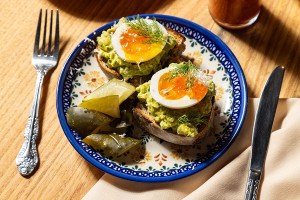Meet the Baker Bringing the Soul of the Golan Heights to Philly
For Kenan Rabah of Majdal Bakery, making za'atar-dusted flatbreads, potato fatayer, and talami is about more than just food — it's about defining his heritage.
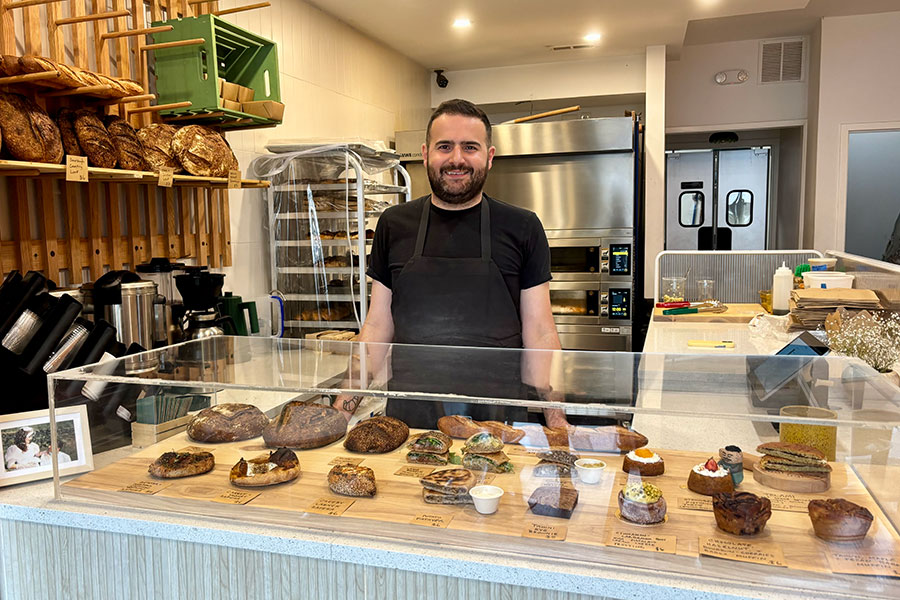
Kenan Rebah, owner of Majdal Bakery / Photograph by Katie Smith
Behind the Line is Foobooz’s interview series with the people who make up Philly’s dynamic bar and restaurant scene. For the complete archives, go here.
When you step into Majdal Bakery it feels like you’ve been invited into the home of owner Kenan Rabah for a comforting bite to eat. Family pictures line the walls, plants consume the window seats, and the moment you walk through the doors, you get a warm greeting from Rabah behind the counter. In the display case are neatly arranged rows of flatbreads topped with herby yogurt and egg, cheesy labneh safeha, chicken schwarma sammies, tahini rye brownies, and babka swirled with tahini, maple, and pecans. Along the wall, perfectly shaped loaves of sourdough bread and spelt baguettes, filling the air with the scent of fresh baked bread and za’atar.
His sweet and savory pastries aren’t just a taste of his childhood. When Rabah came to the United States in 2015 to study at the Restaurant School at Walnut Hill College, his immigration documents listed his nationality as “undefined.” That’s because he comes from Majdal Shams in the Golan Heights, a disputed region between Syria and Israel. Named for his village, the bakery is Rabah’s way of defining his personal identity and sharing his culture with Philadelphia.
After earning his bachelor’s degree, he spent some time baking around the region. He worked at Tabouli in Ardmore, which serves the traditional foods of the Golan Heights, High Street, and Lost Bread Co. before starting his Best of Philly-winning pop-up Majdal in February 2024. He quickly garnered a following, and a few months later, in November, he opened his brick-and-mortar in Queen Village.
Here, Rabah shares the ways his family and homeland influence him, how he blends traditional and modern techniques, and what it means to define his heritage through baking.
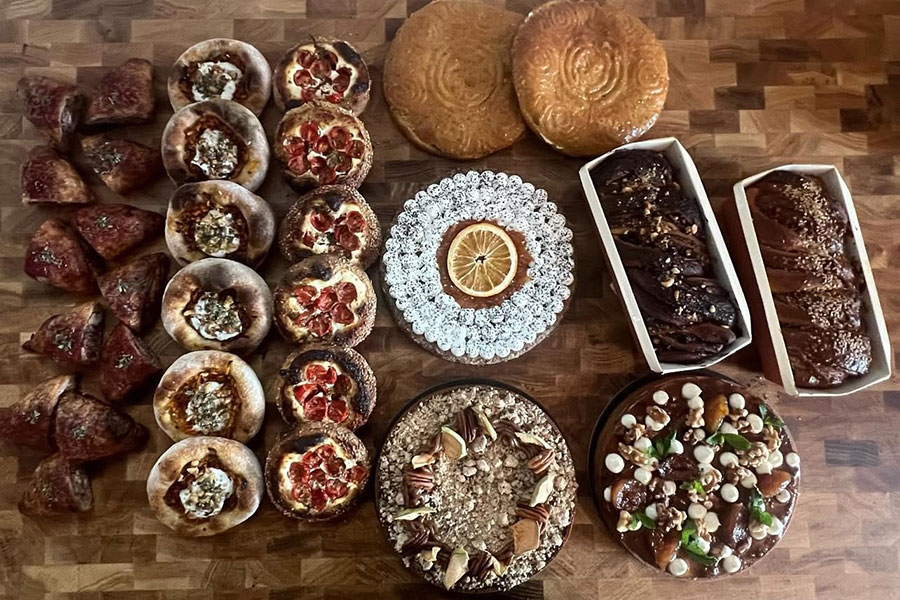
An assortment of pastries from Majdal Bakery / Photograph courtesy of Majdal Bakery
Majdal is shaped by … where I’m from. Golan Heights is very famous for its agriculture. Some of the biggest crops that we grow are apples and cherries, and we live high up on the mountains. My village, called Majdal Shams, is the furthest northern point in Israel. We border Syria and Lebanon. We grow a lot of food, and our diet is usually very plant-based.
Being from such a disputed territory … is unique. I didn’t notice how unique the situation was until I moved to the U.S., and people asked me the question, and I didn’t know how to answer it. But it’s kind of part of what I do right now. It’s very important for me that people know us as more than this political situation and more about our food, our culture. This is a huge part of why I do what I do. I try to define it somehow from my food.
Defining Golan Heights through my baking … means that I want people to feel, even if only a tiny bit, the food and my culture through Majdal. Just experience it even for a second. I had big dreams, but now I am really happy being known as Kenan the baker and that people like my food. That’s all that matters.
I grew up … eating and baking with my mom and grandma. After years of working as a baker, I’ve managed to add my twist on some things, like using different kinds of flours and grains I couldn’t access back home. But a lot of what I do is very traditional and reminds me of something I grew up eating.
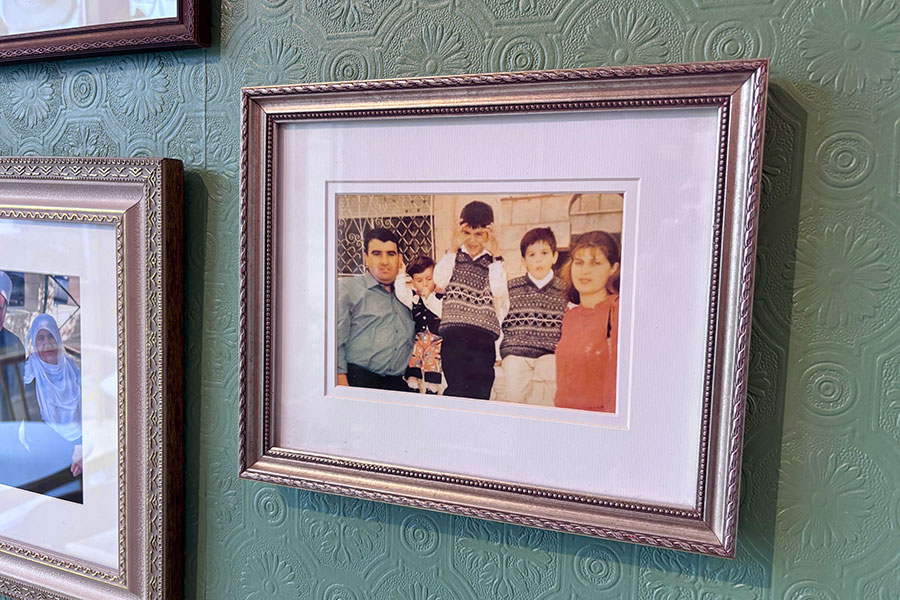
A family photo hanging on the wall at Majdal Bakery / Photograph by Katie Smith
One item Majdal sells from my childhood is … talami, a sweet, spiced brioche dough that we make and press against a decorative wood mold. Back home, this is something we do for special occasions, like for weddings. Usually, when we make it, it’s for a big gathering, We make a lot of it and freeze it. This used to be my favorite activity ever. My mom, my aunts, and my grandma would all gather and make a bunch of them. This is the one thing I remember clearly, and I love. This is the one thing where I didn’t change the recipe at all. I called my mom to ask how to do it and did it exactly as we used to do it.
I learned to bake … as a kid. I was very fascinated by the kitchen ever since I was a baby. I always played with pots and pans and spoons. I grew, and the love of baking grew with me. I started teaching myself how to bake. Eventually, when I graduated high school, I decided I really want to learn and make it a career. I came here and did culinary arts. I used to bake sweet stuff growing up, but I loved to cook as well, so I wanted to learn more how to cook in school. During my college years, I got into bread baking, specifically sourdough, which took me away from cooking and pastry. I became fascinated by bread making.
Bread reconnected me … with my grandma, because she’s a baker who still bakes the old way. Becoming a baker has given me this kind of like huge appreciation for what she is doing. She used to bake professionally. She makes this giant traditional flatbread, called saj bread, that is a pretty labor-intensive process. Recently, with the newer generations, making it is such a skill that they don’t know how to do it anymore. So, they ordered it from my grandma, who makes it the traditional way with a woodfire and everything. It needs a special skillet to make it, and I literally just found one yesterday, and it worked. I turned it on at the bakery, and when it worked, I almost cried. Hopefully, we’ll start making it soon at the bakery.
The idea for Majdal … is more about reconnecting to my roots and doing something as traditional as could be, and less about being a fancy bakery. I needed this outlet.
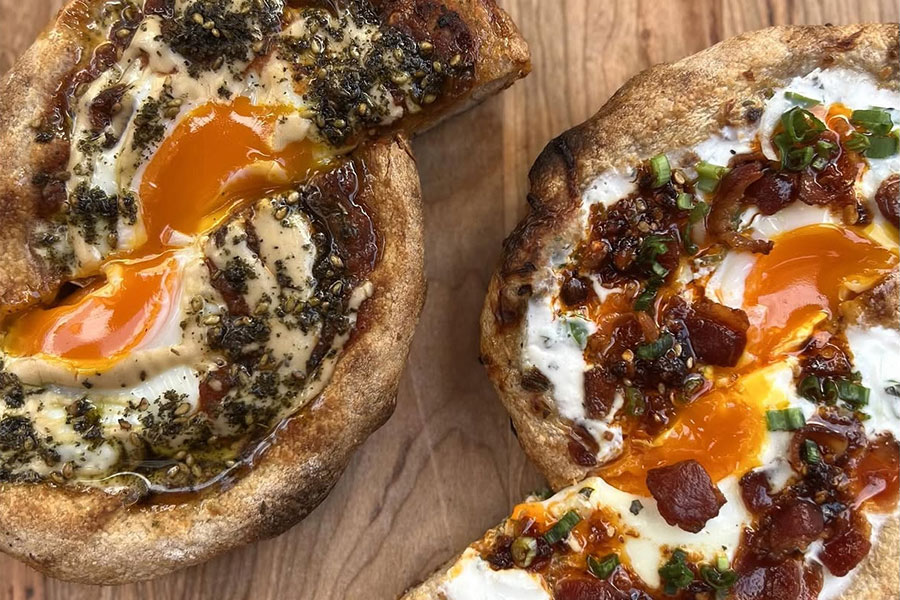
Turkish eggs safehas / Photograph courtesy of Majdal Bakery
My favorite dish … is one of the savory items that is very traditional, the potato fatayer. It’s a very simple flatbread stuffed with shredded potatoes, onions, salt, pepper and cinnamon. That’s another thing: Cinnamon for us is a savory spice. But in America, it’s a sweet spice. I always get a look when I tell people I put cinnamon in potato.
My signature move … is za’atar, which I get from back home. My mom always sends me some za’atar and sumac. My dad has this garden back home and last year, we had a lot of za’atar in it. We dried it and made the spice blend that I use. Now they keep planting more and more za’atar for me.
I want Majdal to feel … like a little slice of Majdal Shams in Philly. I love green, so there’s green everything. You see a lot of plants. I want people to smell the bread that’s being freshly baked. A big thing for me is Fairuz, who is a famous Lebanese singer. For us Middle Easterners, she is like a god. We love her so much, especially me. So we always are playing Fairuz in the background.
When I’m not in the bakery, I … still spend my days off cooking in the kitchen. I’ll make some sort of meal that takes a full day to make. We love stuffing vegetables with rice and meat, every single vegetable under the sun. Stuffed grape leaves are a big hit.
When I started doing Majdal pop-ups last year … I reached out to a few places, and they were so excited to have me and to help me grow this business. Riverwards was my first ever pop-up, and they really helped me get started. Herman’s coffee shop, they still to this day help me. Emily from Machine Shop and Amanda from Her Place were huge influences on me as well. Alex Bois at Lost Bread was one of the best people that I’ve ever met and worked with. He’s very talented and very smart. One big thing about is that he really wants to share the knowledge. It’s more of a movement than a competition. He wants people to have access to whole grain and good sourdough baking, so I admired that a lot. I don’t want to miss anyone.
My plan was to do pop-ups for a year or two, but I got this opportunity to open a bakery that I couldn’t say no. It was because of these people that I was able to grow this and have a customer base before I even opened my bakery.

